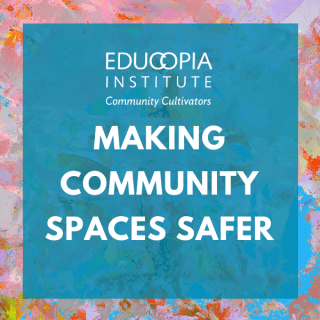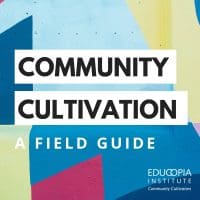
September 8, 2020
Making Community Spaces Safer: On Being “Open”
By Brandon Locke, on behalf of the Educopia teamOver the course of 2020-2021, members of the Educopia staff will be contributing blog posts to the “Making Community Spaces Safer” series. Each post will explore one of our organizational values and describe our efforts to live into that value, including our successes, our failures, and the hard-won lessons that occur in between. We will announce new posts on the Educopia website and on Twitter.
Few words or phrases are quite as ubiquitous (and so nearly universally positive) in the world of knowledge production as the modifier “open.” Most knowledge organizations strive to be open-minded, open to suggestions or criticism, open to collaboration, and open and accountable to our communities. In terms of our work, we promote open access to scholarship, use and recommend open source software, and advocate for the sharing of open data, all with open licenses.
Educopia is no exception—you will have a hard time finding a page on our website or a report we’ve written that doesn’t include it.
The authors of the Open Source Alliance for Open Scholarship have framed the use of ‘open’ productively: “…open often modifies another term such as open source or open access, implying a difference from conventional, closed, or non transparent approaches.” This framing is important, and focuses our attention on why and for whom we are being open. While cost-free software and scholarly communication (combined with liberal licensing) have inherent value, working in accord with open principles also necessitates more—it means re-evaluating our existing systems and seeking transformation through changemaking. Which communities have been included in the production of knowledge and the development of the information infrastructure we are using? Who has been excluded from contributing or accessing knowledge? Which organizational and infrastructural components are liberatory, and which uphold the status quo?
In many ways, this transformative openness is at the heart of the work we do at Educopia. Community cultivation is about bringing people together to share experiences and knowledge, working together to impart change, and making the ecosystem stronger and more equitable.

We are working on the ground with knowledge and information professionals to facilitate conversations and training, develop equitable and sustainable community structures, organize and sustain communities, and create and share knowledge. Based on this community grounding, we work to identify and address large, structural problems affecting the field, such as the lack of diversity in scholarly communications, the policies and technical infrastructure for collecting usage data for OA monographs, and the ways in which universities engage diverse communities in knowledge making and sharing. We also work with our communities and partners to fortify the field and prepare the next generation, by developing curricula and teaching and learning resources for leaders in libraries, archives, and museums; library publishers; students and faculty in need of digital curation training; digital archivists refining their born-digital workflows; and educators teaching digital forensics.
One particular aspect of Educopia’s approach to transformatively open practices—and how this work contributes to a field that is more inclusive, well-informed, and transformational—is the work we do to facilitate knowledge sharing. For practitioners of all kinds, learning about the processes, standards, tools, and mistakes others have made in their work can fundamentally transform the way that they understand and execute their own work.
But sharing local knowledge and processes, preliminary results, failures, and other in-progress, unpolished work doesn’t always come naturally or easily. Knowledge organizations often hold these resources close to their chests because they don’t feel polished or complete enough to share, or because they’re waiting for an opportunity to write an article or give a conference presentation about it. They may consider some unresolvable imperfections in their work as embarrassing or unworthy of further study. Or, they simply may not recognize that our boring, day-to-day processes of maintenance could be exciting and useful to their colleagues.
One ongoing Educopia project stream is exploring strategies for helping knowledge organizations to safely and systematically share this “beta,” “lessons learned,” or “in progress” information with each other. Library Publishing Workflows (LPW) is a two-year IMLS-funded research project to investigate, document, and share information about the processes, platforms, and tools libraries use, and the roles library staff play in the publication of scholarly journals. Based on its predecessor, the highly successful OSSArcFlow project model, the LPW project brings together 12 partner libraries to iteratively develop multiple forms of documentation for the different workflows each library uses, which will be made publicly available for other programs to study, compare, and improve upon. It also encourages our partners and other library publishers to use this model to produce and share their own workflows as they morph and change and mature.
Most library publishing programs have developed services in response to local needs, and initial workflows are generally home-grown, varied, and idiosyncratic. Through our first round of LPW partner interviews, we have discovered that most of our partners employ more than one workflow, based these on the needs of a particular journal, the inertia of legacy journals established years before, and the constraints of staffing and the publishing platform(s) used.
Through interviews and group meetings, our LPW project team is also collecting information about the most painful or problematic parts of each workflow, and any steps or processes a partner wishes it could add or change. We learned from the OSSArcFlow project that these specific “pain points” are of interest to the broader community. They can help to seed conversations about alternative methods, or even spur the development of new tools or software features.
Educopia’s goal in this project is to use interviews, focused group conversations, co-learning opportunities, and project deliverables to open up a broader conversation about ways to scale and mature today’s publishing activities between library publishers and the tool developers and service providers with whom they work. By sharing and analyzing workflow details across many programs, we hope that more library publishers will recognize that nobody has a perfect, pain-free workflow, and openly sharing in-progress workflows in the spirit of generosity and reciprocity will ultimately strengthen the field.
Knowledge organizations embrace the term “open” for good reason—openness leads us toward transparency, toward collaboration, and toward access to knowledge for all. Its ubiquity, though, makes it easy to take the concept for granted, and neglect to consider how or why we’re doing something “openly.” At Educopia, we use the phrase not simply as a way of saying “free” or “public,” but as a provocation for rethinking the systems in which we work and the ways we participate in and uphold them.